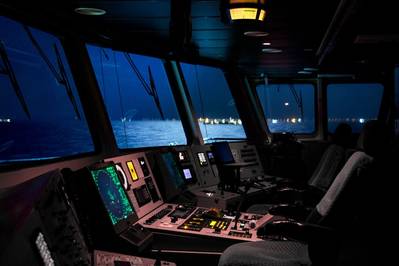The Challenges for Watchkeepers Continue
This week MarineLink reported on the NTSB’s analysis of a 2024 collision on the lower Mississippi that resulted from a tow pilot’s distraction caused by personal cellphone use.
While navigating the tow for about 1.5 hours before the collision, the pilot engaged in non-operational, secondary tasks, including taking an administrative phone call from the company’s safety officer, making a personal phone call and sending text messages.
The pilot had only had about four hours of continuous sleep in the 36 hours before the collision, and he had been up nearly 18 hours at the time.
The NTSB report makes the point: “The risk of distraction increases when an individual is fatigued. Fatigue’s impacts to attention, vigilance and multi-tasking can increase the likelihood that an individual will disengage from their primary task and become distracted by a secondary task.”
Seafarer fatigue continues to be an issue globally. A report released by Cardiff University in May found that work-related fatigue among cargo ship crews has increased. The analysis, from the Seafarers International Research Centre, derives from anonymous questionnaires and interviews with 1,240 cargo ship workers and 1,202 cruise sector workers.
It showed more than a third of cargo ship workers, who were on board a ship when they completed the questionnaire, had not had enough sleep in the past 48 hours.
The seafarers stated that they did not get enough sleep because of the number of hours they worked, the patterns of work they observed, their port duties, vessel movement and noise. These issues have increased since similar data was collected in 2016 and 2011.
A higher number of cargo ship workers also described insufficient sleep due to work-related anxiety, general anxiety and homesickness than in previous surveys. Insufficient sleep due to work-related anxiety was a particularly acute problem among senior officers.
The report come out within days of a cargo ship running aground in Norway, narrowly missing a house. The watch officer told police that he had fallen asleep on the bridge. Authorities are now investigating whether rules regarding rest hours were adhered to on board the vessel.
In the UK Marine Accident and Investigation Bureau’s annual 2024 report released this month, Captain Andrew Moll, Chief Inspector of Marine Accidents, discusses the use being made of digital support on the bridge. He cites the 2023 collision between Scot Explorer and Happy Falcon, saying that there is a need to radically rethink the role of human watchkeepers in the digital age.
The general cargo ship Scot Explorer collided with the gas carrier Happy Falcon about 12 nautical miles north-west of Thyborøn, Denmark. Scot Explorer’s master was alone on the bridge and distracted by other duties that interfered with keeping a safe navigational watch. The vessel’s electronic navigation aids were not being monitored, nor were they optimally set. Both ECDIS units were set to silent mode, with all audible alarms deactivated while underway. Although Happy Falcon was visible on both of Scot Explorer’s radars, the target had not been acquired by an automatic radar plotting aid.
Moll says: “Significant collisions between and groundings of merchant vessels show no sign of reducing. The fatal collision between Scot Carrier and Karin Høj (MAIB report 5/2023) resulted from poor watchkeeping practices. However, the collision between Scot Explorer and Happy Falcon (MAIB completed preliminary assessment 3/2024), the fatal collision between Verity and Polesie (under investigation) and the dramatic and tragic collision of the Solong into the anchored Stena Immaculate earlier this year (also under investigation), indicate a need to radically rethink the role of human watchkeepers in the digital age. Humans do not make good monitors and if under-stimulated they will find other things to occupy themselves.
“But, as the DMAIB4/MAIB application and usability of ECDIS safety study indicated, humans can also be reluctant to utilise system functions that will alert them to impending problems. The MAIB will seek to explore this phenomenon in more depth during future investigations.”
The IMO is also looking in to watchkeeping issues. Meeting in London for its 110th session in June, the IMO’s Maritime Safety Committee agreed to carry out a comprehensive revision of the IMO guidelines on implementing the International Safety Management (ISM) Code, both for administrations and for companies. It also decided to strengthen the consistent enforcement of the code, with support from port state control and by updating related IMO guidelines.
In addition, the Committee prioritized its work to tackle fatigue and hours of work and rest. It will conduct a scoping exercise of relevant legal instruments that aims to address imbalances between workload and crewing levels.
The work is expected to take two years.


















